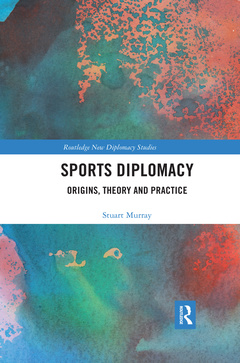Sports Diplomacy Origins, Theory and Practice Routledge New Diplomacy Studies Series
Auteur : Murray Stuart

This book offers an accessible overview of the role sport plays in international relations and diplomacy.
Sports diplomacy has previously been defined as an old but under-studied aspect of the estranged relations between peoples, nations and states. These days, it is better understood as the conscious, strategic and ongoing use of sport, sportspeople and sporting events by state and non-state actors to advance policy, trade, development, education, image, reputation, brand, and people-to-people links. In order to better understand the many occasions where sport and diplomacy overlap, this book presents four new, inter-disciplinary and theoretical categories of sports diplomacy: traditional, ?new?, sport-as-diplomacy, and sports anti-diplomacy. These categories are further validated by a large number of case studies, ranging from the Ancient Olympiad to the recent appearance of esoteric, government sports diplomacy strategies, and beyond, to the activities of non-state sporting actors such as F.C. Barcelona, Colin Kaepernick and the digital world of e-sports. As a result, the landscape of sports diplomacy becomes clearer, as do the pitfalls and limitations of using sport as a diplomatic tool.
This book will be of much interest to students of diplomacy, foreign policy, sports studies, and International Relations in general.
Introduction PART 1: Sport, Diplomacy and Traditional Sports Diplomacy 1. A Revised Anthropology of Diplomacy 2. The Essence of Sport 3. Traditional Sports Diplomacy PART 2: Sports Diplomacy in the Plural, Twenty-First Century 4. 'New' Sports Diplomacy 5. Public and Networked Sports Diplomacy: Theories and Limitations PART 3: Non-state Sporting Actors and Diplomacy 6. The Diplomacy of Non-State Sporting Actors: Representation 7. Non-state Sporting Actors: Communication 8. Non-state Sporting Actors: Negotiation, Intelligence Gathering and Dissemination, and the Minimisation of Friction. PART 4: The Dark Side of International Sport 9. Sports Anti-Diplomacy in the State Context 10. Sports Anti-Diplomacy: Brats, Neo-Emperors, Hooligans and Terrorists Extra-time: Ttraditional Versus New Sports Diplomacy
Stuart Murray is an Associate Professor at Bond University, Australia. He is also a Fellow of the Academy of Sport at Edinburgh University, UK and Associate Editor of the journal Diplomacy & Foreign Policy.
Date de parution : 11-2019
15.6x23.4 cm
Date de parution : 06-2018
15.6x23.4 cm
Thèmes de Sports Diplomacy :
Mots-clés :
Sports Diplomacy; FIFA; English Premier League; ICO; Gay Games; diplomacy; Sports Envoys; globalised society; Key Referent Objects; international relations; International Sportspeople; sport; Colin Kaepernick; Ancient Greece; IOC Member; Salt Lake City Winter Olympics; International Paralympic Committee; Sports Diplomats; Zealand’s Foreign Policy; National Diplomatic System; Brian Boitano; Traditional Diplomacy; Human Security; International Relation System; Diplomatic Scholar; Funeral Games; Anabolic Androgenic Steroids; Global Sporting Arms Race; Zhuang Zedong; Australian Olympic Committee; Chef De Mission



